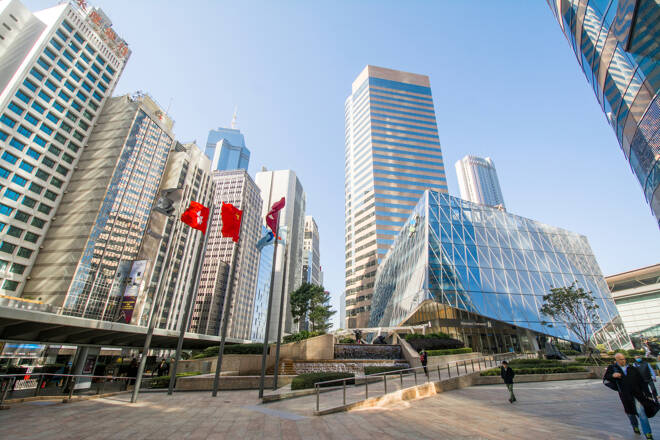Advertisement
Advertisement
Hang Seng Index News: Can Beijing Stimulus and US Trade Hopes Lift to 26,000?
By:
Key Points:
- Hang Seng Index hits a three-year high, fueled by Beijing stimulus hopes and easing US-China trade tensions
- EV stocks BYD and Li Auto gain on upbeat China export data, signaling renewed strength in auto-related equities.
- PBoC holds rates steady at 3% and 3.5%, but market hopes remain high for additional pro-growth policy actions.
Hang Seng Index Hits New Three-Year High
Hong Kong’s Hang Seng Index set a positive mood for the Asian markets. US consumer confidence and inflation expectations painted a rosier picture of the US economy on Friday, July 18, setting the tone for the July 21 session. Meanwhile, Beijing’s increasing focus on China’s economy and hopes for a US-China trade deal bolstered demand for Hong Kong and Mainland China-listed stocks.
On Monday, July 21, the Hang Seng Index extended Friday’s gains in early trading. Real estate and tech stocks contributed to the early gains.
Key upcoming private sector PMI data, trade headlines, and Beijing’s stimulus announcements will continue to influence sentiment. These factors could dictate whether the Index breaks below 24,500 or targets 26,000.
Hang Seng Index Sees Bullish Momentum Build, Spotlighting 26,000
US equity markets posted mixed performances on Friday, July 18, as investors reacted to reports of President Trump pushing for 15% to 20% tariffs as part of an EU trade deal. The Nasdaq Composite Index rose 0.08%, while the Dow dropped 0.32%.
Meanwhile, the Hang Seng Index advanced 0.46% to 24,941 in early trading on July 21. Investors brushed aside US-EU trade headlines as the US and China ease export restrictions on tech and rare earth minerals.
While expectations of further stimulus measures from Beijing contributed to the early gains, the People’s Bank of China’s interest rate decision capped the upside. On July 21, the PBoC kept the one-year and five-year loan prime rates unchanged at 3% and 3.5%, respectively.
Mainland China markets also edged higher in early trading. The CSI 300 and the Shanghai Composite Index rose 0.28% and 0.24%, respectively.
Electric Vehicle and Tech Stocks Shine
Tech heavyweights Alibaba (9888) and Baidu (9988) rallied 2.59% and 1.05%, respectively, sending the Hang Seng TECH Index up 0.87%. Electric vehicle (EV) manufacturers BYD (1211) and Li Auto (2015) posted gains of 2.1% and 0.32%, respectively.
China’s export numbers boosted demand for EV stocks. East Asia Econ reported:
“China—auto exports regain momentum. The rise in exports and the trade surplus clearly isn’t just about autos: there’s now a large surplus in all major mfg categories. Auto exports in fact went sideways in 2023-24 as the initial rise driven by ICE shipments lost momentum. But there are now signs of a second wind, due to EVs and hybrids.”
Meanwhile, the Hang Seng Mainland Properties Index edged up 0.26%.
US Consumer Confidence and Inflation Expectations
The Michigan Consumer Confidence Index rose to 61.8 in July, up from 60.7 in June and beating a consensus increase to 61.5. The Michigan Inflation Expectations signaled a softer inflation outlook, dropping from 5% to 4.4%. July’s survey signaled a potential pickup in consumer spending. Given that private consumption accounts for over 60% of US GDP, higher spending could boost economic activity.
Technical Setup: 26,000 Resistance or 24,500 Support?
On July 21, the Hang Seng Index traded well above its July congestion zone and the 50-day Exponential Moving Average (EMA), signaling bullish momentum.
Further policy support from Beijing and hopes for a US-China trade deal lifted sentiment toward Hong Kong and Mainland-listed stocks.
A trade deal could send the Index through 25,000. A breakout above 25,000 could pave the way to 26,000. Despite the three-year high, downside risks remain, with the 24,500 level still in view. An escalation in US-China trade tensions may trigger a reversal. A drop below 24,500 could expose the 50-day EMA and the crucial 23,500 level.
Hang Seng Technical Outlook
- Resistance: 25,000, then 26,000.
- Support: 24,500, followed by 23,819 (50-day EMA), and 23,500.
- Short-term Bias: Bullish, hinged on Beijing’s policies, US-China trade progress, and Fed policy guidance.
Hang Seng Index Forecast: Will the Index Break Out from 25,000 or Drop to 24,500?
The Hang Seng Index traded above the July congestion zone and the 50-day EMA. Easing trade restrictions on US chip exports and China’s rare earth mineral exports drove the Hang Seng Index to a three-year high.
Further stimulus measures from Beijing and a US-China trade agreement would likely be the next price catalysts for Hong Kong and Mainland markets. Lower tariffs on China and stimulus targeting China’s labor market and domestic consumption could drive the Index toward 26,000.
Conversely, rising US-China trade friction may raise concerns about corporate profit margins, the labor market, and consumption. Domestic price wars and weaker consumer spending may drag the Index toward 24,500, potentially bringing the 50-day EMA into play.
Last week, Beijing pledged to roll out policies aimed at boosting services consumption. The State Administration for Market Regulation (SAMR) also reportedly held talks with Alibaba, Meituan, and JD.com, calling for rational competition in the food delivery space. The news highlighted Beijing’s concerns about company profit trends. Corporate profits slid 9.1% year-on-year in May as weakening external demand fueled domestic competition and price wars.
Will the Hang Seng sustain momentum or retreat? Stay informed with real-time updates as geopolitical risks and US-China developments drive sentiment. Follow our live coverage and consult our economic calendar.
About the Author
Bob Masonauthor
With over 28 years of experience in the financial industry, Bob has worked with various global rating agencies and multinational banks. Currently he is covering currencies, commodities, alternative asset classes and global equities, focusing mostly on European and Asian markets.
Advertisement
